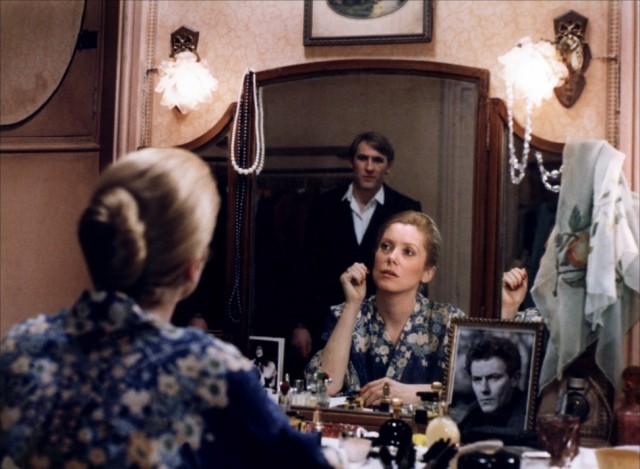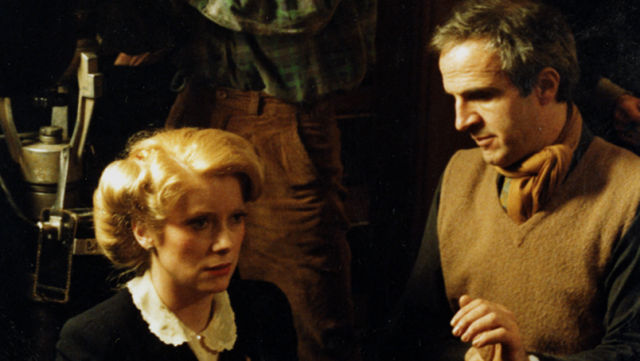
Catherine Deneuve and Gérard Depardieu star in François Truffaut’s gripping WWII melodrama THE LAST METRO
CINÉSALON: THE LAST METRO (LE DERNIER METRO) (François Truffaut, 1980)
French Institute Alliance Française, Florence Gould Hall
55 East 59th St. between Madison & Park Aves.
Tuesday, October 27, $14, 4:00 & 7:30 (later screening introduced by Olivia Bransbourg)
212-355-6100
www.fiaf.org
 FIAF’s CinéSalon series “Theater & Cinema” concludes October 27 with François Truffaut’s powerful Oscar-nominated WWII melodrama, The Last Metro. Set in Vichy France during the German occupation, the film takes place in and around the Théâtre Montmartre, which has been taken over by movie-star actress (and non-Jew) Marion Steiner (Catherine Deneuve) after her husband, Jewish theater director Lucas Steiner (Heinz Bennent), has apparently escaped the Nazi regime. But in fact Lucas is hiding out in the theater’s basement, where he has translated a Norwegian play, aptly titled Disappearance, and is directing it from below. The cast and crew of Disappearance include ladies’ man Bernard Granger (Gérard Depardieu) as Marion’s love interest; costume designer Arlette Guillaume (Andréa Ferréol), who refuses Bernard’s advances because of a secret reason; young actress Nadine Marsac (Sabine Haudepin), who will do just about anything to get parts; stage manager Raymond Boursier (Maurice Risch), who is deeply dedicated to the theater; and Jean-Loup Cottins (Jean Poiret), the stand-in director for Lucas. Only Marion knows where Lucas is, but danger grows when critic, publisher, and Nazi collaborator Daxiat (Jean-Louis Richard) starts sniffing around a little too much.
FIAF’s CinéSalon series “Theater & Cinema” concludes October 27 with François Truffaut’s powerful Oscar-nominated WWII melodrama, The Last Metro. Set in Vichy France during the German occupation, the film takes place in and around the Théâtre Montmartre, which has been taken over by movie-star actress (and non-Jew) Marion Steiner (Catherine Deneuve) after her husband, Jewish theater director Lucas Steiner (Heinz Bennent), has apparently escaped the Nazi regime. But in fact Lucas is hiding out in the theater’s basement, where he has translated a Norwegian play, aptly titled Disappearance, and is directing it from below. The cast and crew of Disappearance include ladies’ man Bernard Granger (Gérard Depardieu) as Marion’s love interest; costume designer Arlette Guillaume (Andréa Ferréol), who refuses Bernard’s advances because of a secret reason; young actress Nadine Marsac (Sabine Haudepin), who will do just about anything to get parts; stage manager Raymond Boursier (Maurice Risch), who is deeply dedicated to the theater; and Jean-Loup Cottins (Jean Poiret), the stand-in director for Lucas. Only Marion knows where Lucas is, but danger grows when critic, publisher, and Nazi collaborator Daxiat (Jean-Louis Richard) starts sniffing around a little too much.
Genre lover Truffaut reaches deep into his cinematic bag of tricks in The Last Metro, paying tribute to film noir, romantic melodrama, war movies, and even musicals as he references Casablanca, The Phantom of the Opera, The Diary of Anne Frank, Gaslight, To Be or Not to Be, The Golden Coach, Notorious, and Cabaret. He takes on anti-Semitism, anti-homosexuality, and anti-humanism in general while setting up a compelling love triangle that is echoed in the play-within-a movie, which is staged on a dramatic, surreal pink Expressionistic set. Depardieu and Deneuve, who went on to make such other films together as Claude Berri’s Fort Saganne, André Téchiné’s Changing Times, and François Ozon’s Potiche, might not be Bogart and Bergman, but they are a magnetic duo, Depardieu’s hulking, brutishly handsome presence dominating confined spaces, Deneuve’s refined, radiant beauty glowing amid a predominantly drab palette. The film uses the metaphor of theater as a way to escape reality, whether on an individual basis or during an international crisis, but of course Truffaut is also citing film as its own escape, a place where people flock to when times are both good and bad. The Last Metro — the title refers to the final train of the night, which passengers must catch in order to not break the strict curfew — is a beautifully made picture, the second in Truffaut’s planned trilogy of films about entertainment, following 1973’s Day for Night and preceding the never-finished L’Agence Magique. Winner of a 1990 César for Best Film of the 1980s in addition to ten previous Césars, including Best Film, Best Director (Truffaut), Best Actor (Depardieu), Best Actress (Deneuve), Best Cinematography (Nestor Almendros), Best Music (Georges Delerue), Best Production Design (Jean-Pierre Kohut-Svelko), and Best Writing (Truffaut and Suzanne Schiffman), The Last Metro is screening at 4:00 and 7:30 on October 27 in Florence Gould Hall; the later show will be introduced by French publisher and fragrance designer Olivia Bransbourg.
